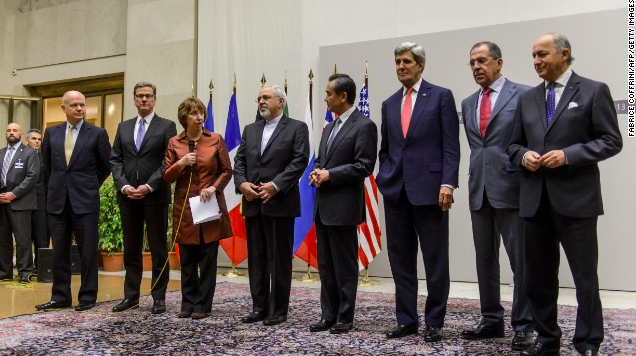aNewDomain — The nuclear deal with Iran is a good thing. President Obama deserves credit for initiating the dialogue and for negotiations that led to terms to which both sides can agree. As Winston Churchill said but too few Americans believe:
— The nuclear deal with Iran is a good thing. President Obama deserves credit for initiating the dialogue and for negotiations that led to terms to which both sides can agree. As Winston Churchill said but too few Americans believe:
“To jaw-jaw is always better than to war-war.”
So why are there still so many high-profile opponents to this agreement, which provides for an inspections regime to enforce Iran’s promise not to develop a nuclear weapons program in exchange for lifting international economic sanctions against the Islamic Republic?
According to the vast majority of writers and broadcasters working for corporate media, the opposition is ideological.
Saudi Arabia, they say, is afraid that Shiite Iran will violate the agreement in order to become the second nuclear state in the Middle East, after Israel, and might threaten to use it against them or one of their Sunni allies. Both Saudi Arabia and Israel, by this way of thinking, are also worried that Iran might increase its support of terrorist organizations as its economy improves.
Since President Obama has promised to veto any attempt by the Republican-led Congress to derail the agreement, and it would be difficult for the GOP to muster the two thirds majority necessary to override the president’s veto, resistance is pretty much pro forma.
According to the Republicans, they’re not afraid of peace or jonesing for war against Iran – they just don’t think there’s any way to prevent the Iranians from cheating the inspectors, and in an echo of the classic complaint that a restaurant has terrible food and such small portions, the inspections don’t go far enough into the future.
The media has been playing his usual role as government transcriber, taking GOP officials at their word.
Even Obama has paid lipservice to these concerns, expressing his own complaints about Iran’s “threats” against Israel in his speech announcing the deal.
In fact, the much-ballyhooed statement by former Iranian President Ahmadinejad about wanting to “wipe Israel off the map” has been debunked. He never said that.)
The truth is, opposition to Obama’s nuclear deal with Iran has a lot more to do with business than ideology.
Iran has the fourth-largest proven oil reserves in the world. After all the sanctions are lifted, energy analysts believe that there will be a significant price drop for a barrel of crude worldwide. “The [International Atomic Energy Commission] thinks Iran can get back to producing 4 million barrels of oil per day — the level it was at in 2008 — by the end of this decade. Oil Minister Bijan Namdar Zangeneh wants Iran to resume its spot as the world’s No. 2 oil exporter behind Saudi Arabia (a spot currently occupied by Russia). But that’s far from assured, and there could easily be hiccups on the way,” reports Vox.
Oil prices have already been declining. This is been terrible news for Saudi Arabia, the world number-one oil producer, currently responsible for about 10 million barrels per day of production. “A potential return of Iranian oil to the market could not have come at a worse time,” Barclays commodities analyst Michael Cohen says. “An increase in Iranian exports beyond 300,000 to 400,000 barrels a day would be difficult for the market to absorb.” Goldman Sachs agrees. So do commodities markets, which pushed oil futures lower when news of the Iran deal broke.
The only terrorism that the Saudi royal family cares about is a 9/11-style attack on their numbered Swiss bank accounts, which they fear might be the effect of all that new Iranian oil coming online. (Anyway, Saudi Arabia is probably in a better position than just about any other country to put a dent in terrorism if it ever felt like it, since it funds radical Wahhabi-inspired madrasahs and insurgent groups throughout Asia and Africa.)
Here in the United States, opposition to allowing Iran to enjoy full trading relations and diplomatic links with the global community is centered around right-wing Republicans in the House and Senate. As with the Saudis, the real reason that they’re against this deal is that it represents a clear and present danger to big oil.
87% of donations by oil and gas companies and 95% of those from the coal industry to members of Congress go to Republicans. The Republican Party is owned lock, stock and barrel by energy conglomerates, which stand to see their profits shrink as oil prices drop in response to the increasing global production anticipated by the revival of Iran’s oil sector.
So the next time you watch talking heads go on and on about the fear that the crazy mullahs of Tehran want to fire an ICBM into Tel Aviv, remember that this rhetoric has a lot less to do with worrying about terrorism or the safety of Israel, and everything to do with oil company profits.













